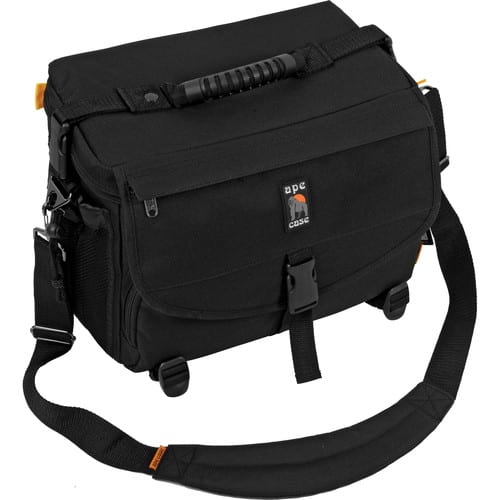- Total145
- Facebook141
- Pinterest4
- Email0

It doesn’t take long to realize that while photography is one of the most satisfying hobbies, it’s also one of the most expensive ones. The gear of even the most casual hobbyist can easily add up into the thousands, while it isn’t a stretch for pro gear to add up to tens of thousands of dollars.
That’s why before you go into the field, you need to know how to protect your gear investment from heat, humidity, sand, and cold. No one wants to have to replace an expensive lens needlessly.
What Can Destroy Your Camera and Gear?
Humidity: It’s not just rain that you need to worry about. Humidity can form from extreme heat, from dew, fog, or any form of condensation. The first step is being aware of your environment and knowing what to do in humid conditions.
Rain: Rainfall ruins an event for both you and the organizers, but even worse, it could ruin your camera and gear. Before you go out for any event coverage, make sure you have planned for conditions such as heavy rainfall. I recommend everyone purchases a rain cover for their camera. It will keep your camera & lens dry in all but the worst rain conditions. And for $20-60, it’s a heckuva lot cheaper than replacing your gear!
If you don’t have a rain cover to protect your camera, then take cover until the rain passes. It’s just not worth risking your precious gear.
Color runs: The Color Run is an untimed five-kilometer event that will wreak havoc with your camera if you're not prepared.

At each kilometer mark of the race, the runners (who are all dressed in white) have brightly colored powder poured over them from head to toe. The runners finish the race in a combination of vivid colors, which makes it so much fun to photograph.
While it’s a fun and exciting even to capture, the powder poses a colossal risk to your gear. Stand back as far as you can and capture the fun with your telephoto lens.
Sand: Sand can ruin your photography gear but the tricky thing is, you don’t even need to dump your gear in the sand for that to happen. Dust blowing in the wind could pose as just as big of a threat because it can coat your camera lens and cause scratches.
Never change lenses in a sandy environment, because sand could get into your camera’s sensor, and if that happens… you’ll be buying a new camera. If you’re shooting on the beach, stay away from the water as much as you can. Water can get into the electronics of your camera and ruin it. If you’re going to shoot on the beach, think about investing in an airtight Pelican case to store your gear.
Heat & Cold: Excessive exposure to heat or cold can damage your camera and its gear beyond repair. Even moving your camera and lenses from an air-conditioned car can cause condensation to form. The same thing can happen when you bring your camera inside in extreme cold conditions. If you can, let you camera gradually warm up before you expose it to heat. The same goes for cold conditions, leave your camera in its bag for at least an hour before you take it out.
If you can’t do this gradual process, place your camera in a tightly sealed plastic bag with a couple silica gel packets. Try to get as much air out of the bag as you can before you seal it up. If you do this right, the condensation should end up on the bag, not the camera. Make sure all the condensation evaporates before you open the bag.

How to Protect Your Photography Gear in Extremes
Protecting Your Gear is Your Top Priority
If you have a gig at a location where the conditions are adverse and you don’t have adequate equipment to protect your camera, skip it. If you damage your gear, you’re you’re not only out of luck, you’re out of business too. Your camera sets you apart from the mobile phone photo takers and also puts food on your table. Make its protection a top priority.
Tools to Protect Your Gear
 Tiffen 77mm UV Protector Filter
Tiffen 77mm UV Protector Filter
UV Filters:
You might think it’s your camera that makes you money, and you wouldn’t be wrong. But if you ask me, I’d say lenses are the real money makers! A top-quality lens always produces better images, even on an entry-level camera. Ensure that you keep that glass clean and free from scratches & cracks because your livelihood depends on it.
When you purchase your lenses, invest in UV filters for them. More than anything else, UV filters act like a second layer of glass over your expensive lens. Although it won’t add extra effects to your photograph like a neutral density filter does, it gives your lens some protection against dust and sand that could leave your lens scratched and dirty.
Padded Camera Bag
For every photographer, investing in a top-quality padded camera bag is a no-brainer. You just never know when your bag could accidentally get dropped and break a lens or camera. A padded bag helps not only helps you pack and keep your gear organized, it also serves to protect your gear against impact.
There are several designs and styles of padded bags for you to choose from. Make sure that the bag you’re choosing has padding both on the outside and inside. This not only helps to keep your photography gear protected from outside impact, but also helps to protect your lenses and camera from hitting each other inside the bag.
If you have of the recommended equipment mentioned in this post, you’ll be ready to go anywhere, any time or season. Believe me, when your camera has to go off for repair, it’s never quite the same again. So your best bet is to keep it from needing a repair. Protect it properly in the first place.
Where to Buy Your Gear
I highly recommend B & H Photo for all your gear needs. Their selection is the best you'll find anywhere, at price points for every budget. From padded bags, to Pelican cases, UV filters and more, check out their amazing selection now.
- Total145
- Facebook141
- Pinterest4
- Email0






